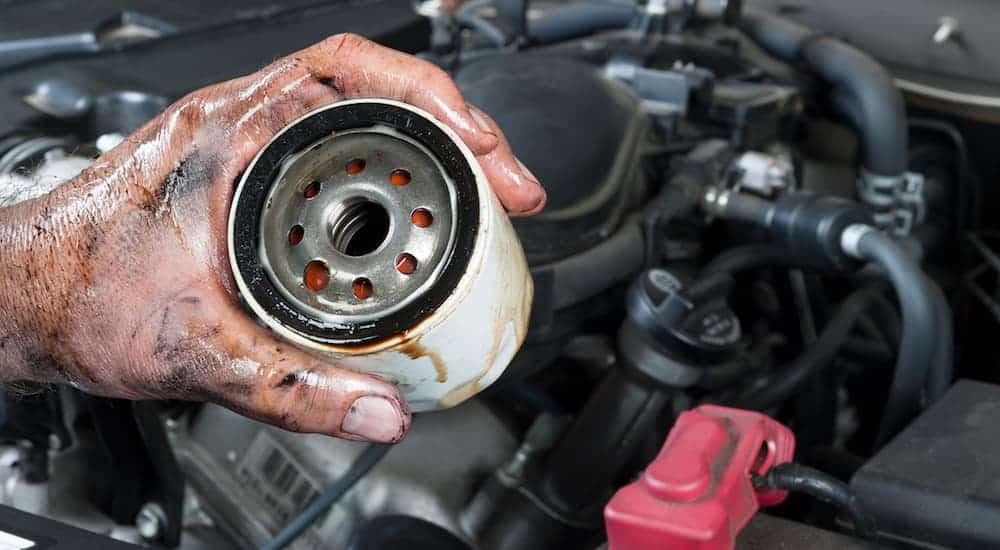If you have owned used cars in the past, then you know that there comes a point where standard oil changes and tire rotations just aren’t enough to keep it running. and simple tire rotations simply won’t cut it. Unfortunately, our vehicles are far from invincible, and over the years, they steadily put on plenty of wear and tear. This wear and tear can seem trivial at first, but if not taken care of can result in some pretty serious mechanical issues. Mechanical repairs such as swapping out transmissions, or repairing broken belts can be expensive. In extreme cases, failing to keep up with your high-mileage maintenance can result in your engine shutting down entirely. So, how do you care for a high mileage vehicle? A lot goes into vehicle maintenance and upkeep. Fortunately, with a bit of technical automotive knowledge and the assistance of a technical expert, you can continue to enjoy a finely tuned engine for tens of thousands of miles to come.
Engine Temperature and Engine Longevity
If your engine is running and you lift the hood, you’ll notice a considerable amount of heat. It makes sense, as every modern gasoline-powered engine is propelled by combustive thrust, which is bound to create plenty of heat. Although that said, there is a limit to just how much heat your engine can withstand. In a lot of ways, excessive heat is the most damaging factor for your engine, wearing down parts, and straining the effectiveness of your motor.
Fortunately, your engine’s cooling system is specifically designed to cool down the operating temperature of your engine. This cooling system is comprised of parts and components that work together to ensure an optimal environment for your engine. The various aspects of an engine’s cooling system include a water pump to circulate coolant, a thermostat to track temperature, the radiator which cools the coolant, air passages in the engine block, a complex network of plumbing, and a radiator cap to seal off this highly pressurized system. This whole system is incredibly intricate and dangerous, especially when the engine is still hot. If there is anything wrong with your cooling system, we recommend that you don’t do any serious inspections or repairs until the engine has cooled adequately. Even removing the radiator cap on a hot vehicle can seriously injure you.
In older vehicles, fighting heat ought to be one of your top concerns. While heat is damaging in every car, in high mileage vehicles, the variety of engine components have likely experienced a huge amount of wear over the years. The best way to fight this heat is to simply maintain your cooling system and ensure every aspect of this system is working at optimal levels.
Motor Oil and High Mileage
Coursing through every engine is a fair amount of motor oil. Motor oil is a highly effective lubricant that is specifically formulated to reduce the amount of friction experienced between all of the various components of your engine. If it weren’t for your engine’s motor oil, all of your engine’s components would be knocking together on a regular basis, causing all kinds of mechanical damage at a rapid pace. While friction between all of these components is inevitable, motor oil can mitigate this friction to a manageable level.

Like all aspects of your engine, motor oil doesn’t last forever. Your motor oil accumulates grime in your engine, which in turn negatively impacts the effectiveness of your motor oil. A lack of lubrication leads to excess friction, and excess friction results in damaged parts. Any car care expert will recommend that you replace your motor oil on a regular basis. While the exact mileage depends on the kind of vehicle you drive, most experts recommend that you change out your motor oil once every 5,000 miles.
There are a variety of motor oil types and grades to consider when changing out your oil. Motor oil can be purchased in one of four types, fully synthetic motor oil, synthetic blend motor oil, standard motor oil, and high mileage motor oil. Although, for the sake of this post, we’ll focus specifically on high mileage motor oil. High mileage motor oil is used in vehicles that have an odometer reading that exceeds 75,000 miles. While other motor oil grades specialize in performance and longevity, high-mileage motor oil is specifically formulated to help high mileage engines run smoothly. At the same time, high mileage motor oil mitigates the amount of smog emitted by your engine.
Motor oil viscosity can play a huge role in the health of your older engine as well. Motor oil can either be thick or thin. Thinner oil can be incredibly lubricating, easily flowing through the engine as a liquid at low temperatures. Thin motor oil doesn’t work as well at high temperatures and under heavy performance demands. Instead, thicker motor oil does an excellent job of sustaining its lubricative properties at high temperatures. So when purchasing motor oil for your used or high mileage car, it is wise to purchase the right type and grade. For instance, if you are the proud owner of a used GMC truck, we’d suggest a high-mileage thick grade motor oil, like 10W-30. Alternatively, if you live in a colder climate and drive a standard sedan, we’d suggest something like a high-mileage 5W-30. Many vehicles have the oil requirements printed right on the cap, or in the owner’s manual. If you plan to change it, it’s always best to speak to your mechanic first.
Your Transmission and Seeking the Skills of Experts
Of all the components in your car, your transmission resides near the top on a long list of importance. Whether your driving a used car or are the proud owner of a brand new pickup truck, your transmission plays a massive role in the movement of your vehicle. Without your transmission, your car is nothing more than a glorified metal wagon.
In good news, your transmission is quite durable and often doesn’t need inspection quite as regularly as your motor oil or cooling system. However, in older high mileage cars maintaining your transmission is crucial for the long-term health of your engine. Maintaining your transmission requires that you check our transmission fluid on a regular basis, use the right transmission fluid, and get your transmission flushed when appropriate. Many mechanics and dealerships offer transmission service at a 90,000 checkup, and check fluids upon request at regular visits. By regularly having your transmission inspected and serviced, you can avoid the costly task of having to replace this essential automotive component completely.
Of course, we highly recommend seeking automotive maintenance and servicing from a team of skilled experts. Sure there are plenty of discount mechanics out there, but there is no guarantee that the work that they’ll provide will be worthwhile. Instead, we suggest seeking out only the most reputable mechanics to ensure the long-term well-being of your engine. Engines are complicated machines, that while durable for the most case, utilize delicate mechanisms and components. From trustworthy local dealerships to well-known car care providers, a trained professional can better guarantee that you avoid serious mechanical issues and enjoy an incredible driving experience for as long as possible.



